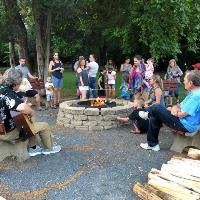The Land and Water Conservation Fund (LWCF) expired at the end of September, putting crucial funding for public land conservation and outdoor recreation access at risk.
LWCF must be periodically renewed by Congress and, despite the popularity of the program, its three-year authorization expired at the end of September without being renewed. This means new LWCF project proposals cannot advance. By letting the program lapse, Congress has jeopardized the ability of states, local governments, and nonprofits to leverage federal funds to secure access to open space and conserve it for future generations.
There is some good news: Before adjourning for the mid-term elections, both houses of Congress advanced bills that would permanently authorize LWCF, setting up potential action in what is commonly referred to as the “lame duck session” (the time after elections but before the expiration of the current congressional session).
H.R. 502 in the House of Representatives would permanently authorize LWCF, meaning that it could not expire again. The Senate bill (S. 569) goes a step further to also fully fund LWCF at $900 million annually with dedicated funding. This means the program would not have to rely on annual appropriations during the budget process, which typically directs at least half of the funds meant for LWCF to other uses.
LWCF uses royalties collected from offshore oil and gas development to provide up to $900 million annually to fund public land acquisition, improve access to land and water for outdoor recreation, and establish green spaces for outdoor recreation in urban areas. Originally passed in 1965, the LWCF Act was strongly supported by the League and represented an acknowledgement that development of energy resources offshore should be balanced by conservation of natural resources onshore. Every county in every state boasts at least one conservation, access, or green-space project funded by LWCF.
To save LWCF, Congress will have to act quickly to pass legislation renewing this critical investment and send it to the president for his signature. When Outdoor America went to press, no further action to reauthorize LWCF had been taken.
The League is working to secure the benefits of LWCF for the long term, and that means getting the program permanently reauthorized to avoid future expiration concerns as well as fully funding the program with dedicated funds that do not need to be appropriated by Congress every year.
 States have leveraged monies available through the Land and Water Conservation Fund not only to conserve beautiful landscapes and important fish and wildlife habitat – from Florida’s Everglades to California’s coast – but also to fund outdoor recreation in urban areas. For example, just outside the nation’s capital in northern Virginia, LWCF funded acquisition of 30 miles of the 45-mile Washington & Old Dominion Trail, which became a model for rail-trails across the country, and helped develop the Bull Run Regional Park campground and soccer field complex.
States have leveraged monies available through the Land and Water Conservation Fund not only to conserve beautiful landscapes and important fish and wildlife habitat – from Florida’s Everglades to California’s coast – but also to fund outdoor recreation in urban areas. For example, just outside the nation’s capital in northern Virginia, LWCF funded acquisition of 30 miles of the 45-mile Washington & Old Dominion Trail, which became a model for rail-trails across the country, and helped develop the Bull Run Regional Park campground and soccer field complex.